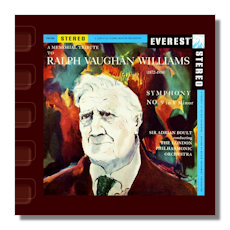
The Internet's Premier Classical Music Source
Related Links
- Vaughan Williams Reviews
- Latest Reviews
- More Reviews
-
By Composer
-
Collections
DVD & Blu-ray
Books
Concert Reviews
Articles/Interviews
Software
Audio
Search Amazon
Recommended Links
Site News
 CD Review
CD Review
Ralph Vaughan Williams

A Memorial Tribute
- Symphony #9 in E Minor
London Philharmonic Orchestra/Adrian Boult
Everest SDBR-3006
Originally intended to be recorded in the presence of the composer, this was made impossible by the composer's sudden death a mere seven hours before sessions were to begin. A short, but moving preface was recorded by the conductor Adrian Boult and is included here. In any event, Boult was a highly regarded and passionate advocate of the composer's work, and while his recorded legacy is hampered by poor ensemble and increasing age, every Vaughan Williams fan is in his debt.
There is no question that this is a emotionally generous performance of this, the composer's final symphony. Decca was either unable or unwilling to allow Boult to record the Ninth; he had already set down the first eight with these forces, and the whole thing seems rather ridiculous. Since Everest was really nothing more than a small-market American label, the fact this record exists at all is a minor miracle. Couple this with the composer's untimely passing and everyone had something to prove, as well as a wish to create something special. It is. The London Philharmonic at this point certainly falls under the "poor ensemble" umbrella in places, and even during his monophonic Decca cycle, Boult was no spring chicken. But despite all this, there is a sense of occasion and commitment that is often missing from the conductor's final efforts for EMI.
The work is somewhat of a puzzler; it doesn't really sound like much of Vaughan Williams' work, and yet, it's so deeply personal as a final artistic statement that none can really question it. Boult captures the varying moods and questions of the work as well as anyone, successfully tying it to the rest of the canon, but also highlighting its unique individuality. Recorded in stereo in 1958, it sounds wonderful on this new release from Countdown Media Group, and at 35 minutes, makes an ideal iTunes download. You can also acquire it from Amazon.com, as a disc with no coupling. I actually prefer that option, as the notes and timings reflect the original LP record. Whatever way you want to get this, I suggest that you do while you can. It's a fitting tribute to a great musician, and if you count Boult, two.
Copyright © 2014, Brian Wigman













